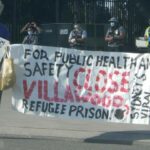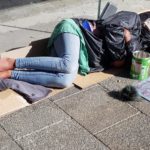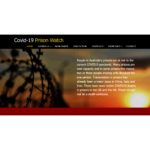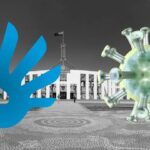Letting COVID Rip Condemns the Vulnerable to Ensure Market Wellbeing
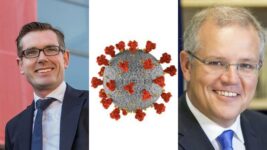
After a year and a half of lockdowns, border closures, mask-wearing and distancing, coupled with the 2021 vaccine rollout, the Morrison and Perrottet governments have championed the “let it rip” pandemic approach, which means late-arriving Omicron is surging at unprecedented rates.
So, the Liberal Nationals long-promised holy grail of a worry-free Christmas-New Year remained elusive, as thousands spent the period lining up to get tested, isolating pending delayed results, trying to source exorbitantly priced rapid antigen tests or just plain avoiding festivities all together.
As NSW premier Dominic Perrottet appeared before the press on Boxing Day to advise reconsideration of PCR testing, as well as re-evaluating whether an ambulance call-out is necessary, it was apparent the prioritisation of public health had become yet another pandemic casualty.
And while it seems clear that the new variant is less likely to result in hospitalisation, a new report emphasises that the “we are all going to get it” catchphrase condemns the vulnerable – people with disabilities, First Nations communities, cancer patients – to a potentially fatal bout of COVID.
No holds barred
Released on 30 December, the OzSAGE report asserts that Perrottet’s decision to remove key restrictions as Omicron hit, as well as a lack of adequate testing and contact tracing, is likely to see a collapse in the hospital system, along with other aspects of civil society due to staffing shortages.
OzSAGE is a multi-disciplinary network of experts independently monitoring the impact of the pandemic in Australia.
The group outlines that the shift towards only the symptomatic undergoing PCR testing, as well as the new definition of a close contact being at least four hours spent with a COVID positive individual in a household setting, ignores the science around how the virus spreads.
Even with the lower percentage rate of people being hospitalised following Omicron infection, as compared to Delta, the report concludes the healthcare system will soon be overwhelmed due to the exponential increase in new variant cases.
“As the virus moves into vulnerable populations, such as older Australians, people with disability and Aboriginal and Torres Strait Islander people,” the experts warn, “we may see a rise in hospitalisation and death as has been observed in countries such as Denmark, which are a week or two ahead.”
And then there’s the yet unknown burden of long COVID on public health.
Personal responsibility
Scott Morrison stated last week that his government won’t be making rapid antigen tests free, as he didn’t want to undercut suppliers, and this week saw him reiterate this position. Instead, the prime minister said that if people want an RA test, they can go out and purchase their own.
With PCR testing no longer an option for all, rapid antigen tests are being spruiked as an alternative. And the PM’s assertion that people should simply go out and buy them ignores that they’re now hard to come by, and when they are available, the prices are exceedingly high.
“We’re now at a stage of the pandemic where you can’t just make everything free, because when someone tells you they want to make something free, someone’s always going to pay for it and it’s going to be you,” Morrison told Sunrise on Monday.
This position is in line with the “personal responsibility” mantra first popularised by Perrottet and now being championed by Morrison.
What this pandemic slogan fails to acknowledge, however, is that there are those who are better placed to take “personal responsibility”, especially when it comes to the funds to buy multiple RA tests, which cost in excess of $20 each: a steep investment for an entire low-income family.
Indeed, personal responsibility in the COVID era is much easier for cashed up citizens who aren’t forced to leave home to work, and don’t have any underlying conditions or disabilities that make them more vulnerable to losing their lives – this is the underlying reality to letting it rip.


